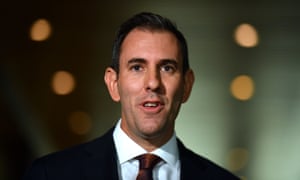Jim Chalmers says his party is prepared to make some compromises by supporting the national energy guarantee
The shadow treasurer Jim Chalmers says if the Morrison government is
serious about kickstarting the economy after the coronavirus, it will
seek bipartisan agreement with Labor on a new energy policy, and end the
decade long climate wars.
In an interview with Guardian Australia’s politics podcast, Chalmers says Labor was prepared to end the “decade-long barney” in the last parliament by supporting the national energy guarantee to “get some certainty in the system”.
He said that mechanism allowed the major parties to bridge their long
running disagreement about how quickly Australia should reduce
emissions “because at some point in the future Labor could dial up the
ambition, and the Coalition theoretically could dial down the ambition
at some future point”.In an interview with Guardian Australia’s politics podcast, Chalmers says Labor was prepared to end the “decade-long barney” in the last parliament by supporting the national energy guarantee to “get some certainty in the system”.
With the government flagging a program of reforms to boost growth as part of the recovery post-Covid-19, Chalmers said energy was the obvious place to start. “If they are serious about getting the economy going again, if they are serious about revisiting some of those things they’ve rejected before – remembering that the last architect of an energy policy is now the treasurer – for all those reasons I think it would be worth seeing if something is possible.”
A leading Australian business organisation, the AiGroup, has recently called for the two biggest economic challenges in memory – recovery from the Covid-19 pandemic and cutting greenhouse gas emissions – to be addressed together, saying that would boost economic growth and put the country on a firm long-term footing. A number of other community and investor groups have expressed similar sentiments.
“I guess what I am relaying is what business says to me … business can’t understand why we can’t get a resolution on energy, and if you think about our challenges on growth, employment and wages, then I think any serious objective observer would say energy has got to be part [of post-Covid recovery].”
Chalmers said it “remains to be seen” whether the major parties could come to terms but he said Labor’s attitude towards the national energy guarantee indicated “there were compromises Labor was prepared to make to get some kind of certainty in the system so business could invest with confidence”.
In a wide-ranging conversation, Chalmers also flagged Labor would look to develop policies during the current parliamentary term that recognised that unemployment was likely to remain elevated in Australia after the worst of the coronavirus economic shock had passed.
New figures released this week show the jobless rate in Australia has hit the highest level since September 2015, with seasonally adjusted employment falling by 594,300 in April. The Australian Bureau of Statistics said around 2.7 million people, or one in every five person employed in March, either left employment, or had their hours reduced between March and April.
Chalmers said there was a problem with demand in the economy and there was also a problem that the unemployment benefit was too low. The shadow treasurer said he was not an advocate of universal basic income as a concept. Universal basic income provides all citizens with a cash payment, replacing traditional welfare systems.
But Chalmers said there was clearly a need to “rethink whether the social safety net is stitched together robustly enough to deal with crises like [Covid-19] and the aftermath of crises like this”. He said reference points for that conversation would be job guarantees, or labour market programs like Working Nation – a labour market program from the Keating era.
Chalmers said there was an “appetite” for a place-based labour market program “where we recognise for young people in particular, they may be unemployed for longer, and we need to think in innovative ways how we employ these people”.
He said central to his thinking was the need to avoid “inter-generational carnage” after an economic downturn. “I think a first world, first rate, wealthy country like ours shouldn’t have disadvantage cascade through the generations.” Chalmers said he was particularly concerned about workers aged over 55 and young people becoming detached from the labour market.

No comments:
Post a Comment